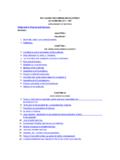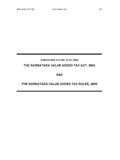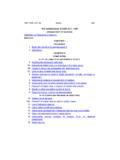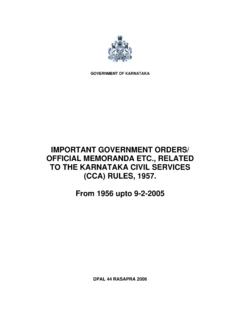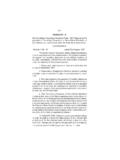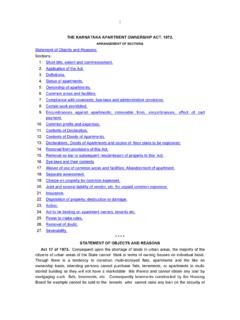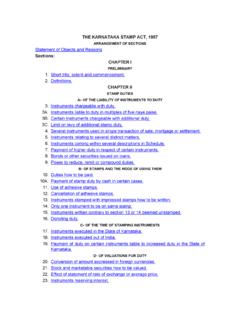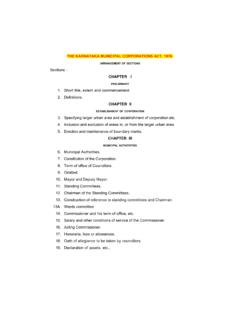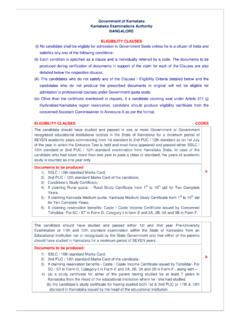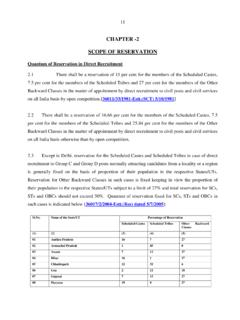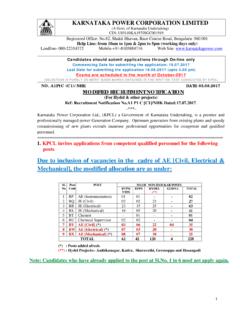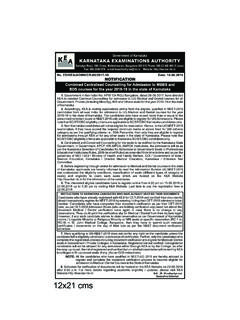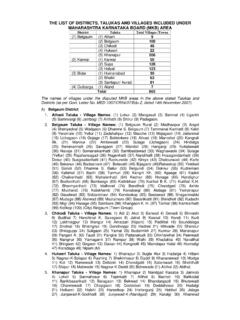Transcription of THE KARNATAKA FINANCIAL CODE, 1958 …
1 THE KARNATAKA FINANCIAL code , 1958 NOTIFICATIONNo. FD I COD 58, dated 1st April 1958In exercise of the powers conferred by clause (2) ofArticle 283 of the Constitution of India and in supersession ofthe Rules contained in the Mysore FINANCIAL code , Volume 1(1952 Edition) with Appendices and Forms as contained in theMysore Civil Account code , Volume 1 (1927 Edition) asamended, other than the rules relating to contingent expenditure,the Governor of KARNATAKA , hereby makes the following rules,namely.
2 -CHAPTER - ITITLE AND DEFINITIONS1. (1) These rules may be called the KARNATAKA FinancialCode, 1958.(2) They shall come into force on the First day of If the Government considers it necessary or expedientso to do for avoiding any hardship or removing any difficultythat may arise as a result of the application of these rules, itmay subject to such restrictions and conditions, if any, as it maythink fit to impose, dispense with or relax the provisions of anyof these rules in any case or class of In this code .
3 Unless the context requires otherwise thefollowing words and phrases have the meanings hereby assignedto them:-2(1) Accountant General means the head of the Office ofAudit and Accounts who maintains the accounts of the Stateand exercise Audit functions in relation to those accounts onbehalf of the Government.(2) Abstract Bill .-A bill without details either forcontingent or travelling allowance expenditure, paid at a treasurywithout the scrutiny and countersignature of a controllingauthority, to save delay in the discharge of a claim.
4 (3) Budget Calendar means the calendar fixed byGovernment for the preparation of the budget estimates and forcompletion of the State Budget of the year (Refer to the BudgetManual).(4) Budget Estimates are the detailed estimates of thereceipts and expenditure of a FINANCIAL year. (Refer to the BudgetManual).(5) Cash Order means an order issued by a TreasuryOfficer for private remittances on another Treasury, of a specifiedamount to a specified person.(6) Cheque means a written order (not expressed to bepayable otherwise than on demand) addressed by a person calledthe drawer to a Bank or Treasury to pay a specified sum ofmoney to himself or to a third party known as the payee andincludes a demand draft drawn on any specified Bank.
5 (7) Controlling Authority means the Head of adepartment or other departmental officer who is entrusted withthe responsibility of controlling the incurring of expenditureand/or the collection of revenue by the subordinate authoritiesof a (8) Disbursing Officer means a Government servant whodraws moneys from the Treasury on bills or cheques, butexcludes a Government servant who is not the Head of anoffice and draws only his own pay and allowances from thetreasury.
6 (9) FINANCIAL Year means the year beginning with the 1st April and ending with the following 31st March.(10) Government means the Government of KARNATAKA .(11) Government Servant means any person serving inconnection with the affairs of the Government, whetherremunerated by salary or not, and includes every person who isauthorised to receive, keep, carry or spend moneys on behalf ofGovernment.(12) "Head of a Department" means any authority speciallyordered by the Government to be the Head of a Department(vide Appendix 1).
7 (13) Inevitable Payments means money which isindisputably payable.(14) Inspecting Officer means a Government servant whois appointed solely or mainly for performing specified duties ofinspection which involve touring the State and does not includea Government servant who performs inspection dutiesoccasionally as part of his general supervision of hissubordinates.(15) Lapse of Grant means the expiry at the close of thefinancial year of the sanctioned grant not utilised for expenditureor the unexpended portion of the sanctioned grant, except grantswhich are specially exempted from the rule of lapse (Refer tothe Budget Manual).
8 4(16) Local Body means a District Board, a MunicipalCouncil, Village Panchayat, Trust Board, etc.(17) Local Fund means:-(1) the revenues administered by Bodies which come underthe control of Government by law or rule having the force oflaw whether in regard to the proceedings generally or to specificmatters such as the sanctioning of their budgets, sanction tothe creation or filling up of particulars appointments. theencashment of leave, pensioner similar rules; and(2) the revenues of any body which may be speciallynotified by the Government of KARNATAKA as such.
9 (18) Major Head means a main head of account for thepurpose of recording and classifying receipts and disbursementsof moneys that enter into the accounts of Government (Refer tothe Budget Manual).(19) Miscellaneous Expenditure means all expenditureother than that falling under pay and allowances, contingenciesand works.(20) Proposition Statement means a statement to besubmitted to Government setting forth the FINANCIAL effect of aproposal for revision of establishments.(21) Re-appropriation means the transfer of funds fromone head of account to another.
10 (Refer to the Budget Manual).(22) Receipts of Government means and includes allmoneys received by a Government servant on behalf of theGovernment, not only the proceeds of taxation and the yield ofordinary revenue but also capital receipts, such as, the proceedsof sales of land; the proceeds of borrowing operations unfounded5debt, and such receipts of a banking or deposit nature as byvirtue of any statutory provision or of any general or specialexecutive order of the Government have to be held in the custodyof the Government.
